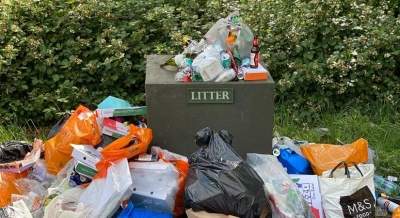New Delhi (IANSlife) Our world is literally overrun with tonnes of plastic that can severely endanger everything that is essential for supporting life on the planet. That means not only humans, but other organisms, in fact, entire ecosystems are at the risk of getting wiped out.
The single-use plastic scourge is responsible for choking oceans, soil systems, rivers, and other land-water bodies. Single-use plastics have long been synonymous with convenience and ease of availability but the damage they pose to society is true, irreversible. Through their extensive production, dispersal, and litter, single-use plastics are becoming the number one source of pollution impacting both humans as well as the environment.
It is extremely necessary to curtail the use of Single-Use Plastic Products (SUPPs) in our society. The open burning of plastic waste, intake of plastic-contaminated seafood, and the formation of harmful microplastics are just some of the factors why SUPPs should be put out of use. In fact, eliminating the use of single-use plastic is also one of the important objectives of the United Nations Decade on Ecosystem Restoration.
As per the recent report released by the UN Environment Programme (UNEP) titled From Pollution to Solution, there are presently between 75-199 million tons of plastic waste lying in the ocean, and in 2016 about 9-14 tons of waste made its way into the aquatic ecosystem. It has been projected that by 2040, this amount would have multiplied three times to about 23-37 million tons per year. As the largest, most harmful, and most persistent of marine litter, Plastics make for about 85% of all marine waste. More than their essential composition, it is the single-use characteristic of such plastics that makes them such a big-time detriment to the planet.
Here are some effective ways to phase out SUPPs and switch to sustainable alternatives:
Switch to eco-friendly alternatives
Prioritizing reusable products not only cleans up the environment but can also help you save a few bucks. Businesses today are encouraging customers to fetch their own bags, cups, or containers that can help in avoiding the use of SUPPs. At the same time, companies will save on storage expenditure for these plastics while customers will no longer have to pay extra for shopping bags or containers. It is no surprise that Cotton and non-woven polypropylene shopping bags are becoming a norm as they are recyclable and handier than plastic.
From Single-use to Plastic-use
Reusing products helps in decreasing their negative impact on the environment. If it is impossible to refrain from using SUPP.s consumers should seek to minimize their side effects by recycling them whenever possible instead of directly discarding them. For instance, it is possible to reuse and repurpose single-use plastic bags, bottles, cups, tableware, and takeaway food packaging
Embrace Circularity
The entire onus of curtailing the impacts of SUPP should not fall on the end consumer. It is also the duty of policymakers and manufacturers to create products that are lightweight and sturdy to increase reusability. Sustainable products are those, which are made from renewable energy and recycled materials.
Sourcing locally and avoiding air-freight transported goods is another way to reduce the environmental impact of products over their life cycle, is by locally sourcing and shunning foods transported by air or freight. It is also important to consider the end-of-life impacts of each product so that products can be aptly recycled or discarded in an eco-friendly manner when they reach the end of their usage.
Considering the social and geographical context
With a global ban on SUPPs soon coming into place, policymakers must take into account the various geographical and social circumstances when on the lookout for feasible alternatives. A slew of Factors ranging from production requirements, expected use, reusability, the likelihood of littering, local waste management infrastructure, and education play a role in determining just how eco-friendly these alternatives are.
The number one priority remains shifting towards reusable options and encouraging recycling and waste management infrastructure. Meanwhile, places that face the problem of littering problems should avoid using lighter products as they carry more chances of getting littered.
Last but not the least, the most successful strategy to restrict the use and spread of Single-use plastic is removing it from the equation, altogether. Only by implementing a global campaign against the use and spread of Single-use plastic can we hope to eliminate it.

